ioc_programmeIode
Courses tagged with "ioc_programme::iode"

ECOPOceanTech-2024
Introduction to Oceanographic Survey Techniques and Data Management
Summary
Global change requires studying the ocean in more detail and at longer and larger scales. Capacity development and training on standard survey techniques and the use of simple sensors has been identified as a tool to enhance ocean observation. This course serves as an introduction to oceanographic survey techniques and data processing. It is designed for Early Career Ocean Professionals (ECOPs), students, and other oceanographers who intend to pursue oceanography and marine sciences. Relevant oceanographic (physical, chemical, and biological) datasets will collected and used during the training, making it easy to relate, understand, and apply the course concept.
Venue: AquaBioTech Group, Mosta, Malta
Learning outcomes
By the end of the course, the learners are expected to:
- Be familiar with oceanographic survey techniques.
- Understand how to use simple data collection tools and sensors.
- Be familiar with measurement of temperature, salinity, turbidity, depth oxygen and chlorophyll.
- Produce meaningful descriptive statistics and informative graphs from raw data.
- Results interpretation and discussion for scientific communication and writing.
Course contents
The course will be divided into 4 modules:
Module 1: Field sampling techniques for basic coastal oceanographic parameters
- Introduction to oceanographic parameters temperature, salinity, turbidity, depth oxygen and chlorophyll.
- Preparing a field work checklist,
- Safety measures during field work
- Calibration, and deploying of sensors and equipment
- Field surveys
Module 2: Data visualization and management
- Data retrieval
- Data entry
- Data visualization in R software using ggplot package
- Simple analysis using R
- Data management: storage, sharing and repository
Module 3: Basics of scientific writing
- Language and structure
- Graphics and visuals
- Citation and referencing
- Plagiarism
Module 4: Basics of science communication and outreach
- Language and sentence structure in science communication
- PowerPoint Presentation
- Visuals for infographics
- Policy briefs
Target audience
ECOPs who are enrolled in a Bachelor’s or Master’s degree, or have completed their Masters Degree and intend to use this knowledge in their academic or research related work. No prior R knowledge will be required, but knowledge on basics of oceanography is desired. The current course is specifically targeting ECOPs from and/or based in the Mediterranean region (from Southern Europe, Northern Africa and Western Middle East).
Language of instruction: English
Moderators and Instructors
Ines Boujmil – Aqua Biotech Group
Dr. Anabel von Jackwoski - Stockholm University
Mr. Gabriel Akoko Juma – Alfred Wegener Institute, Germany
Organizers
This course is being organized with the support of the Early Career Ocean Professionals Programme, Alfred Wegener Institute, Helmholtz Centre for Polar and Marine Research, Stockholm University, Aqua Biotech Group, International Ocean Institute, Jean Monnet Centre of Excellence on Sustainable Blue Economy and UNESCO-IOC Ocean Teacher Global Academy.
Details: https://oceanexpert.org/event/4367

Geomar2024ES
Introducción a la geología y minería de fondos marinos
La minería de fondo marino implica la extracción de minerales valiosos ubicados en el lecho marino, ofreciendo una fuente potencialmente crucial de recursos minerales para satisfacer la creciente demanda global. Estos recursos, que incluyen nódulos polimetálicos, costras de ferromanganeso ricas en cobalto y sulfuros masivos polimetálicos, se encuentran en áreas profundas del océano, a menudo a profundidades de 4.000 a 6.000 metros. La ubicación de estos depósitos es de importancia geológica, ya que refleja procesos geológicos únicos, como la precipitación de minerales a partir de fuentes hidrotermales o la lenta generación de costras de ferromanganeso ricas en cobalto en los montes submarinos y nódulos en las llanuras abisales. Estos depósitos albergan una variedad de metales valiosos, desde cobalto y níquel hasta tierras raras, que son esenciales para tecnologías modernas como energía renovable y electrónica. Sin embargo, la minería de fondo marino plantea desafíos significativos, tanto técnicos como ambientales. La tecnología necesaria para acceder y extraer estos recursos en entornos submarinos extremos aún está en desarrollo, y existen preocupaciones sobre los posibles impactos ambientales, como la alteración de los ecosistemas marinos y la liberación de sedimentos contaminados. A pesar de estos desafíos, la minería de fondo marino representa una oportunidad para diversificar las fuentes de recursos minerales y abordar la creciente demanda global. Sin embargo, se requiere una cuidadosa evaluación de los riesgos y beneficios, así como una regulación efectiva para garantizar que se realice de manera responsable y sostenible.
En este curso online de difusión se plantea generar una primera aproximación de algunos conceptos claves de la minería de Fondo Marino, legislación, tecnologías y métodos de exploración de minería en fondos marinos, hábitat y ecosistemas, y evaluación de impacto ambiental.Objetivo de aprendizaje
Este cuso tiene como objetivo proporcionar los conocimientos generales e iniciales sobre la geología de fondos marinos y una de las posibles aplicaciones, la minería de fondos marinos. También tiene como objetivo divulgar las acciones que se llevan a cabo a nivel regional e internacional, el manejo del impacto ambiental y diferentes conceptos para generar una primera aproximación a la temática.
¿Para quién es?
Investigadores y personal con actividades que involucren geología marina, geología de fondos marinos, minería de fondos marinos, oceanografía y/o biología marina.
Los resultados del aprendizaje
Al completar con éxito esta capacitación, los alumnos podrán:
- Identificar los conceptos generales de la geología de fondos marinos.
- Conocer las formalidades y regulaciones en cuanto a los fondos marinos.
- Conocer las actividades de minería de fondos marinos y diferentes métodos y tecnologías.
- Conocer las implicancias de impacto ambiental de estas actividades.
El curso se divide en los siguientes módulos:
Módulo 1: Conceptos clave de la minería de Fondo Marino
La creciente demanda de materias primas y la transición hacia energías renovables, bajas en emisión de carbono, implica la búsqueda de nuevo recursos minerales. En este módulo se abordarán los principales de depósitos minerales en el fondo marino: nódulos polimetálicos, costras de ferromanganeso ricas en cobalto y sulfuros masivos polimetálicos, su génesis, ambiente de formación y características generales.
Módulo 2: Régimen jurídico aplicable a las actividades en los fondos marinos y oceánicos
En esta unidad se propone abordar el marco legal que regula las actividades de exploración y explotación en la Zona: la Convención de Naciones Unidas sobre Derecho del Mar, el Acuerdo relativo a la aplicación de la Parte XI de la Convención de las Naciones Unidas sobre el Derecho del Mar de 10 de diciembre de 1982, la jurisprudencia internacional relevante y el estudio de las regulaciones y decisiones adoptadas y en curso de negociación en el marco de la Autoridad Internacional de los Fondos Marinos.
Módulo 3: Tecnologías y métodos de exploración de minería en fondos marinos
Los avances en las etapas de prospección y exploración en ambientes marinos profundos han impulsado el desarrollo de nuevas tecnologías orientadas al reconocimiento e identificación de áreas potencialmente mineralizadas. En este módulo, se abordarán los diversos métodos, tanto directos como indirectos, empleados en la prospección y exploración de los tres tipos de depósitos minerales en ambientes marinos profundos.
Módulo 4: Evaluación de impacto ambiental en minería de Fondo Marino
Como ocurre con la mayoría de los desarrollos industriales humanos, la extracción de minerales del fondo marino afectará la composición, estructura y funcionamiento de las comunidades biológicas que viven de los propios minerales, así como el entorno marino más amplio y los hábitats cercanos. En este módulo se plantea la identificación y abordaje de los potenciales impactos de la minería de fondo marino.
Formato
ONLINE - A su propio ritmo, con clases grabadas con consultas a través del foro.
Evaluación
Evaluación final a través de examen de opciones múltiples.
Duración
Tiempo estimado requerido para completar el curso de 8 horas , entre 12 de Noviembre a 15 de Deciembre 2024.
Cómo inscribirse

QGIS_India2024
Coastal Vulnerability Mapping and Analysis using QGIS 2024

OCRS_India2024
Ocean Colour Remote Sensing - Data, Processing and Analysis 2024
Ocean colour analysis is a proven tool for determining the health of
ocean using oceanic biological activity through optical means. Phytoplankton
pigment, chlorophyll, are indicators of equilibrium of CO2
concentration between atmosphere and ocean. The oceanic colour changes due to chlorophyll
a provides the level of primary productivity whereas the colour change due to
CDOM can be attributed to the level of pollution and higher particulate matter.
The ability of optical sensors to map the spatial and temporal patterns of
ocean colour over regional and global scales has provided important insights
into the fundamental bio-optical properties and bio-physical processes
occurring in the aquatic media. Chlorophyll, SST and PAR can be operationally
scaled up to estimate primary production and estimate the fish stocks. This
training focuses on the basics of marine optics, ocean colour remote sensing,
and its applications such as mapping primary productivity, phytoplankton
classes and algal blooms.
Find all details about this course in: https://oceanexpert.org/event/4299 ;
Attendance to this course is by application only. Access will be granted to the selected participants.

BlueCarbon_China2024
Observation technique about blue carbon
This training course will focus on raising the knowledge on the monitoring, assessment, and accounting of marine blue carbon. And also the related instrumentation and calibration of some biogeochemical parameters are the main content of the training course. The course will use case studies relevant for the Western Pacific.
Learning outcomes
By the end of the course, the participants should:
- Have a comprehensive understanding of the monitoring and assessment of coastal blue carbon.
- Be able to explain the role of connotation, Classification, and Accounting of Marine Carbon Sequestration.
- Be familiar with the instrumentation and calibration of some biogeochemical parameters.
Target audience and prerequisites
Include, but are not limited to, the following researchers and management staff on marine ecological observation, who deal with biogeochemical parameter measurements and instrumentation.
Language of instruction: English
Course content
Day 1 The monitoring and assessment of coastal blue carbon
Day 2 Connotation, Classification, and Accounting of Marine Carbon Sequestration
Day 3-5 Instrumentation and calibration of some biogeochemical parameters (dissolved oxygen and pH in seawater for example)
- utilization and maintenance of dissolved oxygen and pH instruments/sensors
- calibration of dissolved oxygen and pH sensors for seawater use in a lab
- calibration method of multi-parameter compensation for optical dissolved oxygen sensor in seawater
Instructors
Learner assessment and certificate
Assessment will be done through (online) quizzes.
Successful completion of the assignments (passmark: 80%) and active attendance of all of the synchronous sessions will be needed to be awarded a certificate of completion
Technology requirements
To complete this course, you should have access to:
- Latest version of either Chrome, Edge, or Firefox, web browsers
- Access to internet
- Firewalls must be disabled in order to be able to attend the synchronous live sessions
Course Duration, Synchronous Sessions, and Format
The course will take place online between November 25 to 29, 2024, with a duration of approximately 20 hours.
This is a 20-hour training course that will run online between 25-29 Nov 2024, including 3 (daily) synchronous sessions to be held between 13-16 pm (UTC+8) using BigBlueButton web conferencing platform.
The course includes 15 hours of synchronous work (content and discussion) plus 5 hours of individual asynchronous work for completion of assessments.
Application process and selection criteria
A limited number of seats (45) are available. Please complete the online application form available on this LINK. The applications start 01 October 2024. The deadline to submit the application is 31 October 2024 (23:59 CET: Central European Time).
UNESCO is committed to promoting equal access principles. Applications from minority or underrepresented groups are strongly encouraged.
The Selecting Committee will be set up by the hosts (NCOSM and NMDIS), which will comprise the course coordinator, organizers, and lecturers. Selection criteria include the applicant’s academic background, professional experience/duties (such as marine observation, blue carbon and ecosystem data management), and how the applicant will be able to apply the new knowledge acquired. Priority will be given to participants from the West Pacific
Contacts
- Course Coordinators: YU Jianqing yujianqing@ncosm.org.cn; Xu Dian ncosmws@ncosm.org.cn
- OTGA Secretariat: ioc.training@unesco.org
Costs
Free of charge. There are no tuition fees.
The instructors will give the course voluntarily with support from NCOSM.
Cancellation policy
In the event of cancellation of the course by the OTGA or its affiliates, we will provide notification of cancellation at least 7 days prior to the course date. In the event of cancellation by the attendee, we should receive notification of cancellation at least 7 days prior to the course date.
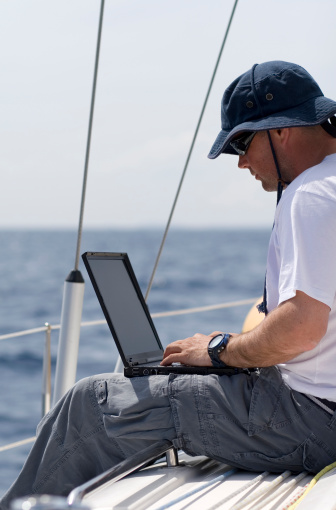
SP_ODM2024
Ocean Data Management 2024
This online, fully self-paced training course provides a comprehensive introduction to the management of marine data, including the guiding principles of data management and typical responsibilities for data managers, data stewards and scientists.
This course is developed by, and for, marine data managers, data stewards and researchers, working in institutions responsible for the collection and good management of marine data.
During this training course, you will be introduced to several general aspects related to the management of marine data, including, metadata, quality control, data policy, data sharing and publishing, data management plans and the research data life cycle. By the end of this course, you will be able to describe and implement the core tasks required for the processing of marine data, explain the importance of metadata, advise researchers on the research data life cycle and explain why a good data management plan is key from the very first initiation steps of a project.
Learning outcomes
By the end of this training, participants should be able to:
- Describe the phases of the Research Data Life Cycle
- Explain the concept of a Data Management Plan
- Explain the concept and importance of metadata
- identify suitable file formats for data preservation and sharing
- Identify appropriate repositories for your data
- Summarise the goal of assigning a data licence
- Explain the common concerns related to data reuse
Target audience
Marine data managers, data stewards and researchers, working in institutions responsible for the collection and good management of marine data.
This is a self-taught course that includes quizzes designed to help learners assess their own learning at regular intervals.Learner Assessment
This is a self-taught course that includes quizzes designed to help learners assess their own learning at regular intervals. In order to successfully complete the course and award a Certificate at the end, the following is mandatory:
- complete all lessons in each Module of the course;
- complete all quizzes (70% minimum score for each quiz);
Note: submitting the course feedback survey is mandatory to obtain the course certificate.
Technology requirements
To complete this course, participants should have access to:
- Computer with Windows or Mac operating system
- Latest version of either Chrome, Edge, Firefox, or Safari web browsers
How to enroll
Please register on the OceanExpert website (www.oceanexpert.org). Once your OceanExpert account is approved (this is not done immediately), you can self-enrol in the course. If you already have an OceanExpert account, you can self-enrol in the course using your OceanExpert username and password. Enrolment is available until 1 December 2024.
First log-in OceanTeacher, then access the course page and click on self-enrollment.
The enrolment key is Odm2024-2
For any questions please contact the OTGA Secretariat (ioc.training@unesco.org) always using the name of the course as email subject.
There are no tuition fees.
UNESCO is committed to promote equal access principles. Applications from minority or underrepresented groups are strongly encouraged.
Feedback survey
At the end of the course, you will be asked to fill out a feedback survey. This information will be used to improve future courses.

QMF2024
Quality Management System Essentials for NODCs and ADUs 2024

MGIS2024ES
Tecnologías de información (SIG) aplicado al medio marino y costero 2024
El curso proporciona conocimientos básicos acerca de los Sistemas de Información Geográfica (SIG) aplicados en un caso de estudio en el que se determinarán zonas de conservación usando el software ArcGIS. El curso incluye temas como: métodos de adquisición de datos, técnicas de procesamiento, análisis espacial e interpretación de datos, creación de productos basados en los resultados de los análisis y publicación con herramientas online de ESRI.
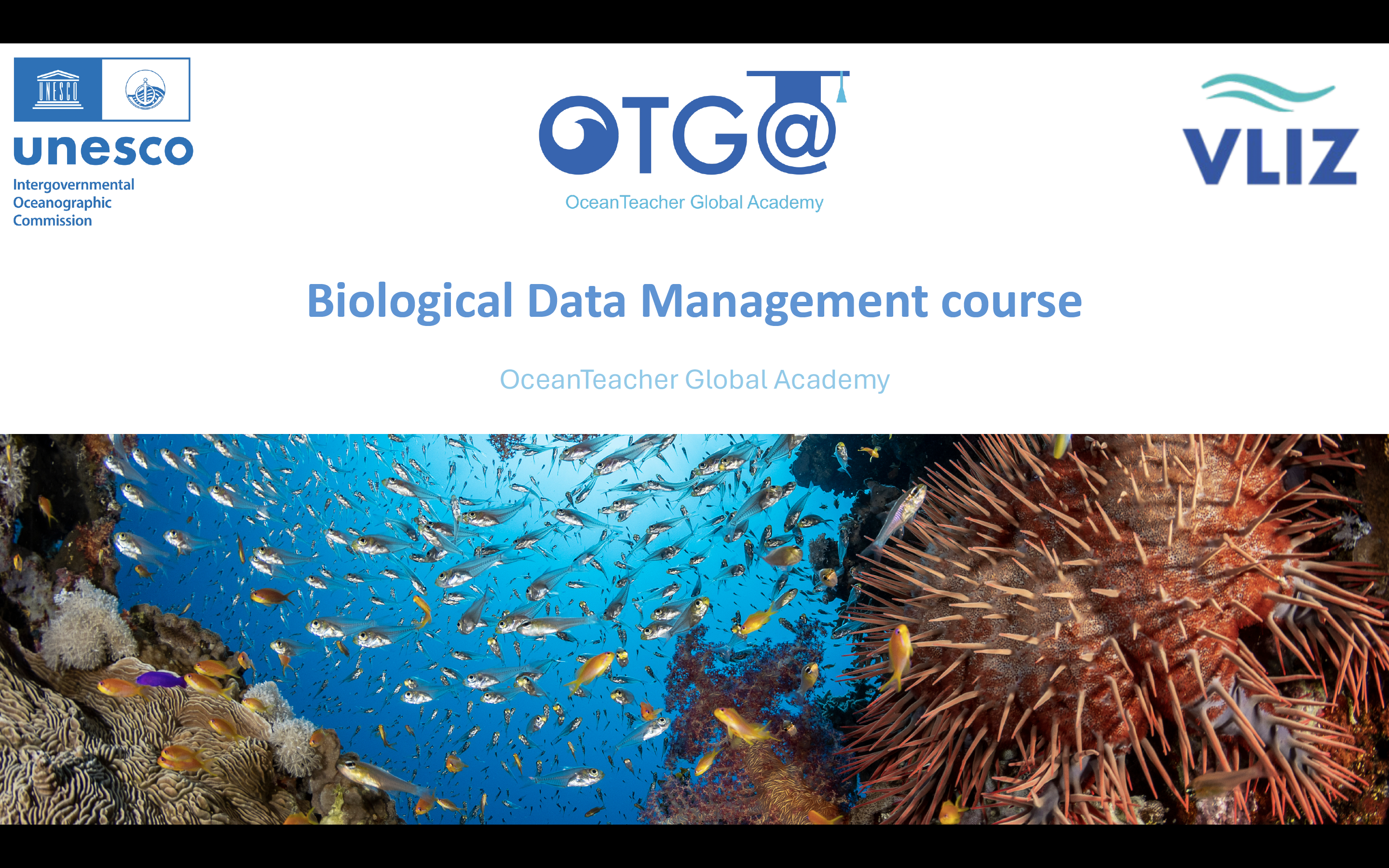
SP_BDM_2024
Biological Data Management
This course will provide a comprehensive introduction for the management and archive of marine biological data, including the guiding principles of biological data management and typical responsibilities for data managers. Several types of biological data will be tackled, including observational data, image-derived data and omics data and how these data can be formatted, standardized and quality controlled before being submitted to wider regional, national and international initiatives. Watch the video below for a brief overview and introduction.
Find all the information on how to enroll in this course on OceanExpert: https://oceanexpert.org/event/4213
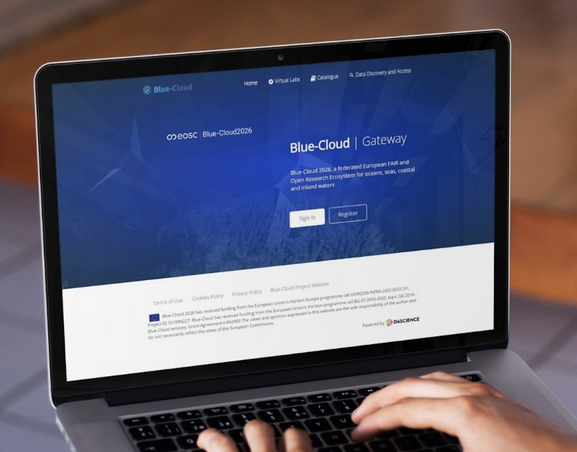
Blue_Cloud_2023
Blue-Cloud 2026
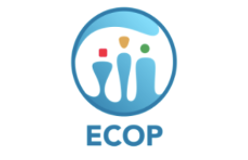
ECOP-R_2023
Ocean Data Analysis with R Programming for Early Career Ocean Professionals (ECOPs) - Africa
The course serves as an introduction to R programming language and software environment (RStudio) for data exploration, cleaning, organizing, analysis and visualization. Relevant oceanographic (physical, chemical and biological) datasets will be used in the training, making it easy to relate, understand and apply the course concept. The course is designed for Early Career Ocean Professionals, hence, no prior experience is required.

ECOP-R_2023-2
Ocean Data Analysis with R Programming for Early Career Ocean Professionals (ECOPs) - Asia
The course serves as an introduction to R programming language and software environment (RStudio) for data exploration, cleaning, organizing, analysis and visualization. Relevant oceanographic (physical, chemical and biological) datasets will be used in the training, making it easy to relate, understand and apply the course concept. The course is designed for Early Career Ocean Professionals, hence, no prior experience is required.


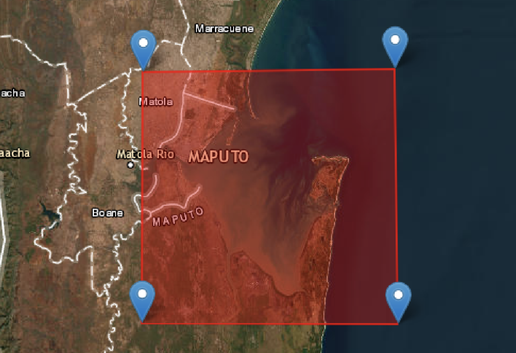
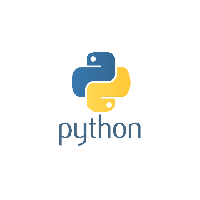
![Implementação da arquitetura do Sistema de Dados e Informações Oceânicas (ODIS) [individualizado]](https://classroom.oceanteacher.org/pluginfile.php/70224/course/overviewfiles/OIH_Facebook_180x180px.jpg)
![Implementación de la arquitectura del Sistema de información y datos oceánicos [Ritmo propio]](https://classroom.oceanteacher.org/pluginfile.php/69993/course/overviewfiles/OIH_Facebook_180x180px.jpg)
![Implementing the Ocean Data and Information System (ODIS) architecture [self-paced]](https://classroom.oceanteacher.org/pluginfile.php/69941/course/overviewfiles/OIH_Facebook_180x180px.jpg)
![Mise en œuvre de l'architecture du Système de données et d'informations océanographiques [individuel]](https://classroom.oceanteacher.org/pluginfile.php/70044/course/overviewfiles/OIH_Facebook_180x180px.jpg)
